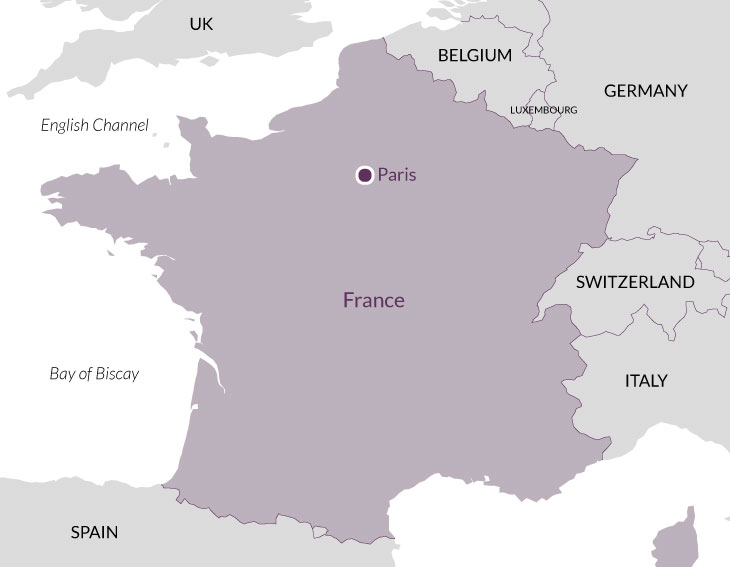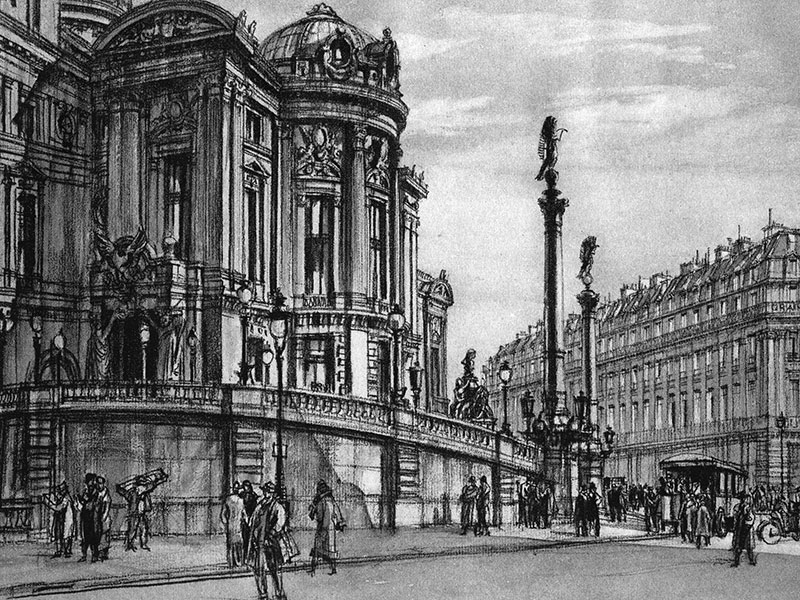Overview
Music and Paris are intricately intertwined: opera and ballet are central to the city’s social and cultural life, and Paris in turn has shaped both art-forms to an extent few other places can rival. It boasts not one but two of the world’s greatest opera houses: the sumptuous Opéra Garnier, completed in 1875, and the monumental Opéra Bastille, opened in 1989 for the bicentenary of the French Revolution.
For much of the Opéra’s 350-year existence, achieving success in Paris has been a crucial career goal, attracting musicians here from across the world. The Hungarian-born Franz Liszt moved to Paris at the age of eleven and maintained a lifelong connection with the city. His virtuosic music provides the exhilarating score for Kenneth MacMillan’s Mayerling, premiered at Covent Garden in 1978 and regarded by ballet companies worldwide as one of the most formidable challenges in the repertoire. It tells the story of the 1889 suicide pact between the Archduke Rudolph, heir to the throne of the Habsburg Empire, and his teenaged lover Mary Vetsera. The Palais Garnier provides an appropriately fin-de-siècle setting for MacMillan’s inspired recreation of this catastrophic incident.
The fin-de-siècle theme continues with our first two operas: both were based on plays written in the decade following Rudoloph and Mary’s deaths, and premiered in theatres only a mile or so from the Palais Garnier – an indication of the extraordinary intensity of Paris’s theatrical as well as musical life.
Uniquely among Oscar Wilde’s works, Salome was written in French; the author’s fascination with the titular character – a shadowy, unnamed figure in the New Testament source – was shared by French writers and artists including Flaubert, Moreau, Huysmans, Laforgue and Mallarmé, whose portrayals all left their imprint on Wilde’s scandalous play. By the time Salome was premiered Wilde was in Reading Gaol, but its fame quickly spread to Germany, where it immediately inspired Richard Strauss to create his most sensational opera. We see Salome in a new production by American director Lydia Steier, making her debut at the Opéra Bastille; the title role is taken by French/South African soprano Elza van den Heever, while Finnish superstar Karita Mattila plays Herodias for the first time.
Tosca’s journey from the spoken to the operatic stage was similarly swift: Victorien Sardou’s La Tosca was premiered at the Théatre de la Porte-Martin in 1887, with Sarah Bernhardt in the title role; the 1900 premiere of Puccini’s opera in Rome was an event of national significance, with attendees including Italy’s Prime Minister and Queen. Pierre Audi’s much-acclaimed production draws out the religious themes of the work, crystallised in the memorable finale to Act I where the chorus sings the Te Deum as Scarpia reveals his evil intentions towards the singer Tosca and her lover Cavaradossi. Scarpia is played by British/Canadian baritone Gerald Finley, while the fast-rising Russian soprano Elena Stikhina takes on the title role.
The Magic Flute has no particular connections with the fin-de-siècle – nor with Paris, beyond the three visits made here by the composer early in his career – but is one of the best-loved of all operas. Such are the philosophical and emotional resonances of its mysterious story that it offers inexhaustible inspiration to producers. Robert Carsen is fascinated by the piece’s construction from a series of opposites – ‘day and night, love and hate, man and woman’ – and draws on Mozart’s own words about life and death to create a production of moving simplicity. Bavarian soprano Christiane Karg makes her house debut in the role of Pamina.
Day 1
Travel by Eurostar at c. 10.30am from London St Pancras to Paris. Afternoon visit of the Opéra Bastille.
Day 2
A morning lecture precedes a guided tour of the sumptuous Palais Garnier opera house. Return to the Garnier after lunch for a matinée performance of Mayerling (Franz Liszt), Kenneth MacMillan (choreographer), Martin Yates (conductor).
Day 3
Morning lecture, then visit the Jacquemart-André museum, a lavish residence built in 1875 for the banker Edouard André which houses the collection he made with his wife, Nélie Jacquemart, a painter. It contains a fine collection of 18th-cent. paintings: Dutch, Flemish and Italian masters. Free afternoon. Evening at the Opéra Bastille: Salome (Richard Strauss), Lydia Steier (director), Simone Young (conductor), Elza van den Heever (Salome), Zoran Todorovich (Herodes), Karita Mattila (Herodias), Iain Paterson (Jochanaan), Tansel Akzeybek (Narraboth).
Day 4
Morning lecture, then drive to Porte de la Villette to visit the Cité de la Musique and the music museum. Lunch is followed by some free time. Evening at the Opéra Bastille: Tosca (Puccini), Pierre Audi (director), Paolo Bortolameolli (conductor), Elena Stikhina (Tosca), Brian Jagde (Mario Cavaradossi), Gerald Finley (Scarpia), Sava Vemić (Cesare Angelotti), Michael Colvin (Spoletta).
Day 5
After a morning lecture, visit the Louvre to explore the connections to this evening’s opera in the Egyptian collection. Free time to explore the rest of the museum. Evening opera at the Bastille: The Magic Flute (Mozart), Robert Carsen (director), Antonello Manacorda (conductor), Pavel Petrov (Tamino), Christiane Karg (Pamina), Brindley Sherratt (Sarastro), Caroline Wettergreen (Queen of the Night), Iurii Samoilov (Papageno), Tamara Bounazou (Papagena), Michael Colvin (Monostatos).
Day 6
The morning is free before the Eurostar to St Pancras, arriving at c. 4.45pm.
Price, per person
Two sharing: £3,430 or £3,260 without Eurostar. Single occupancy: £4,040 or £3,870 without Eurostar.
Included
Return rail travel (Standard Premier) by Eurostar from London to Paris; private coach for transfers; hotel accommodation; breakfasts, 3 dinners and 1 lunch with water, wine, coffee; all tips; all taxes; the services of the lecturer and tour manager.
Music & Ballet
Tickets for 4 performances (Optima (top) category) are included costing c. £570.
Accommodation
Hotel Villa Beaumarchais, Paris: a 4-star hotel, located on a quiet street, a short walk away from the Opéra Bastille and Marais district. Single rooms are doubles for sole use.
How strenuous?
We walk to and from three of the operas, 20 minutes on foot from the hotel. Visits require a fair amount of walking and standing around. There are some late nights but starts are leisurely. You need to be able to lift your luggage on and off the train.
Are you fit enough to join the tour?
Group size
Between 10 and 22 participants.
Travel advice
Before booking, please refer to the FCDO website to ensure you are happy with the travel advice for the destination(s) you are visiting.

'To have four excellent and yet different musical experiences in four days was wonderful.'
'This was the most enjoyable tour I have ever done from every aspect. I had not seen or heard these works before and each theatre was beautiful.'
'The music was top class. Each opera was a memorable experience.'
